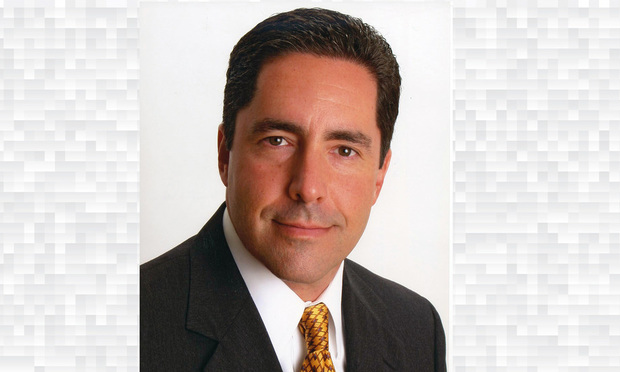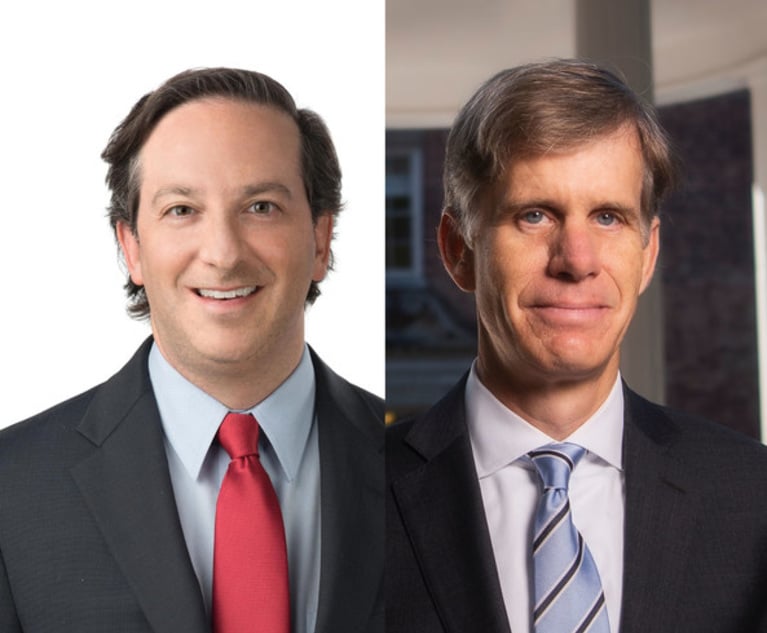Can High-End Engagement Counsel Help Overworked, Under-Resourced Legal Departments?
The innovative aspect of this model is the ability to recruit and place successful, experienced attorneys—former law firm senior associates and partners.
August 09, 2019 at 12:59 PM
5 minute read
 Dave Slovin, president of PracticeProfs (Courtesy photo)
Dave Slovin, president of PracticeProfs (Courtesy photo)
Over the last few years, corporate legal departments have been feeling the same pinch as the rest of corporate America, and they’re getting the same message: Control and manage costs. With already overworked staff and an increasingly strategic role within most companies, GCs are looking for innovative legal service delivery models that let them flex their support capabilities while maintaining fixed budgets and lawyer head count.
At the same time, successful law firm attorneys are beginning to explore new alternatives to the traditional partner track. In years past, their options were limited to going in-house or opening their own firms. While many firms have adapted and offer more career options, today’s flexibility-seeking attorneys are starting to embrace engagement-based roles that allow them to meet (or exceed) financial, professional and personal goals.
The result of these two converging dynamics is a new delivery model for high-end engagement attorney support—one that ultimately provides benefits for corporate legal departments, law firms and attorneys.
“The engagement-based counsel model is so appealing right now because it provides the perfect pairing of specialized talent with specialized needs in today’s on-demand work environment,” said Logan Ide, former GC of GoodWorks International and current Georgia market president for Latitude, a legal services company that specializes in providing engagement-based attorneys. “We often see the model free up outstanding talent that clients can then use in a wide variety of creative applications.” (Disclosure: My firm occasionally does project-based work for Latitude.)
The concept of engagement-based staffing isn’t new. Hospitals regularly engage highly skilled ER physicians and nurses during peak demand to minimize fixed costs. Corporate IT, finance, marketing and HR departments turn to project-based specialists during major initiatives and business transformations. Even in the legal sphere, on-demand paralegals and document review attorneys supplement corporate and law firm staff.
The innovative aspect of this model is the ability to recruit and place successful, experienced attorneys—former law firm senior associates and partners. There’s no lag time or risk for GCs who need to quickly expand their teams. Because of their extensive experience, these specialist attorneys can essentially parachute in, make an immediate impact and then move onto the next engagement.
 Elizabeth Chandler
Elizabeth ChandlerMany GCs, like Beth Chandler of Rollins Inc., are already finding that the system offers potential solutions for their departments’ changing needs.
“Because of our increasingly central role but finite resources, my team is moving toward adopting this type of engagement-based model. I think that traditional firms can also embrace this new dynamic, as they work with clients and respond to RFPs, by including nonlaw firm providers as a part of their teams,” Chandler said.
As corporate legal pressures continue to rise and as GCs have to react to new priorities and challenges, including regulations, reputation management and M&A activity, the concept of engagement-based support will only gain appeal. For some corporations, it may supplement existing relationships with law firm partners—providing experienced attorney coverage at a savings vs. law firm rates. For others, it may be a component of a larger move to shift work in-house without adding head count.
 Thomas Mars
Thomas MarsThomas Mars, who currently represents high-profile NCAA athletes, saw the need for this legal support model in his previous role as general counsel at Walmart.
“Our large portfolio of work gave us leverage. We still wanted the name-brand firms to handle the most complex and public matters, but we knew that the best-suited lawyers for each situation were not necessarily part of the same firm,” he said. “Now, I see more of my peers employing a hybrid staffing approach that includes boutique law firms and engagement-based attorney specialists for high-risk and high-fee matters. It significantly reduces costs without impairing objectives or affecting outcomes.”
At this point, corporations are still leading the movement, but innovative law firms are increasingly adopting this new deployment model internally. Engagement-based attorneys are helping firms meet surges in client demand, keeping the work in-house without disrupting promotion expectations and partner tracks of the core team.
While awareness and use of the engagement-based model grows at corporations and law firms, Ide is finding that attorneys are still playing catch-up on the potential benefits for them.
“Corporations and more progressive law firms are jumping on board, but many lawyers have never heard of these engagement-based roles,” he said. “They are intrigued, especially when I can tell them we’ve found sophisticated, wide-ranging applications for attorneys with all kinds of backgrounds—from an Am Law 50 securities attorney to a senior litigation associate at a boutique firm.”
As the engagement-based attorney model continues to expand, it’s likely that more attorneys in diverse, in-demand practice areas will get on board, seeking the flexibility and work-life balance that’s often so hard to find in the legal profession.
Dave Slovin is president of PracticeProfs, an Atlanta-based agency that provides comprehensive marketing management services for law firms.
This content has been archived. It is available through our partners, LexisNexis® and Bloomberg Law.
To view this content, please continue to their sites.
Not a Lexis Subscriber?
Subscribe Now
Not a Bloomberg Law Subscriber?
Subscribe Now
NOT FOR REPRINT
© 2025 ALM Global, LLC, All Rights Reserved. Request academic re-use from www.copyright.com. All other uses, submit a request to [email protected]. For more information visit Asset & Logo Licensing.
You Might Like
View All

On The Move: Ex-Partner Returns to Lead Nelson Mullins Corporate Group, Burr & Forman Hires University GC as COO
5 minute read
Law Firm Sued for Telemarketing Calls to Customers on Do Not Call Registry

Trending Stories
- 1We the People?
- 2New York-Based Skadden Team Joins White & Case Group in Mexico City for Citigroup Demerger
- 3No Two Wildfires Alike: Lawyers Take Different Legal Strategies in California
- 4Poop-Themed Dog Toy OK as Parody, but Still Tarnished Jack Daniel’s Brand, Court Says
- 5Meet the New President of NY's Association of Trial Court Jurists
Who Got The Work
J. Brugh Lower of Gibbons has entered an appearance for industrial equipment supplier Devco Corporation in a pending trademark infringement lawsuit. The suit, accusing the defendant of selling knock-off Graco products, was filed Dec. 18 in New Jersey District Court by Rivkin Radler on behalf of Graco Inc. and Graco Minnesota. The case, assigned to U.S. District Judge Zahid N. Quraishi, is 3:24-cv-11294, Graco Inc. et al v. Devco Corporation.
Who Got The Work
Rebecca Maller-Stein and Kent A. Yalowitz of Arnold & Porter Kaye Scholer have entered their appearances for Hanaco Venture Capital and its executives, Lior Prosor and David Frankel, in a pending securities lawsuit. The action, filed on Dec. 24 in New York Southern District Court by Zell, Aron & Co. on behalf of Goldeneye Advisors, accuses the defendants of negligently and fraudulently managing the plaintiff's $1 million investment. The case, assigned to U.S. District Judge Vernon S. Broderick, is 1:24-cv-09918, Goldeneye Advisors, LLC v. Hanaco Venture Capital, Ltd. et al.
Who Got The Work
Attorneys from A&O Shearman has stepped in as defense counsel for Toronto-Dominion Bank and other defendants in a pending securities class action. The suit, filed Dec. 11 in New York Southern District Court by Bleichmar Fonti & Auld, accuses the defendants of concealing the bank's 'pervasive' deficiencies in regards to its compliance with the Bank Secrecy Act and the quality of its anti-money laundering controls. The case, assigned to U.S. District Judge Arun Subramanian, is 1:24-cv-09445, Gonzalez v. The Toronto-Dominion Bank et al.
Who Got The Work
Crown Castle International, a Pennsylvania company providing shared communications infrastructure, has turned to Luke D. Wolf of Gordon Rees Scully Mansukhani to fend off a pending breach-of-contract lawsuit. The court action, filed Nov. 25 in Michigan Eastern District Court by Hooper Hathaway PC on behalf of The Town Residences LLC, accuses Crown Castle of failing to transfer approximately $30,000 in utility payments from T-Mobile in breach of a roof-top lease and assignment agreement. The case, assigned to U.S. District Judge Susan K. Declercq, is 2:24-cv-13131, The Town Residences LLC v. T-Mobile US, Inc. et al.
Who Got The Work
Wilfred P. Coronato and Daniel M. Schwartz of McCarter & English have stepped in as defense counsel to Electrolux Home Products Inc. in a pending product liability lawsuit. The court action, filed Nov. 26 in New York Eastern District Court by Poulos Lopiccolo PC and Nagel Rice LLP on behalf of David Stern, alleges that the defendant's refrigerators’ drawers and shelving repeatedly break and fall apart within months after purchase. The case, assigned to U.S. District Judge Joan M. Azrack, is 2:24-cv-08204, Stern v. Electrolux Home Products, Inc.
Featured Firms
Law Offices of Gary Martin Hays & Associates, P.C.
(470) 294-1674
Law Offices of Mark E. Salomone
(857) 444-6468
Smith & Hassler
(713) 739-1250






